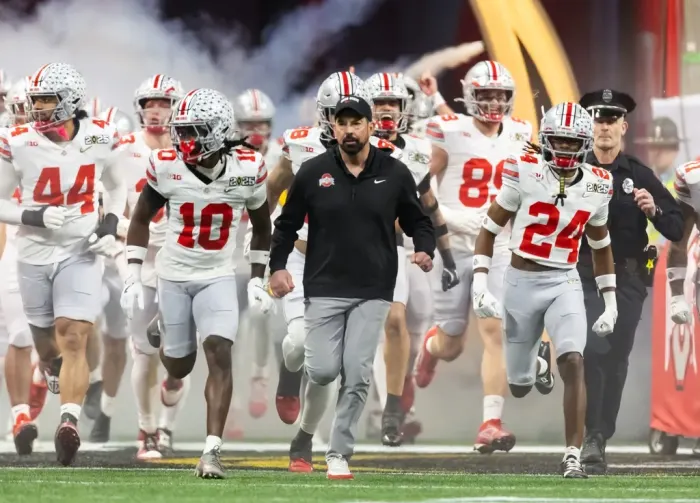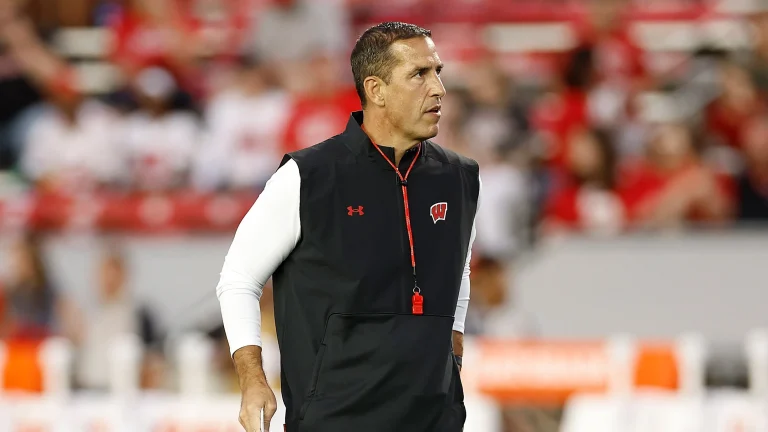No. 11 Wisconsin finding new way to win this season by showcasing an explosive offense
MADISON, Wis. — Wisconsin decided to shake up a formula that had made it one of the nation’s most consistent programs.

The results are evident from the box scores.
A program traditionally known for draining the shot clock is scoring at a rate Badgers fans haven’t seen in more than half a century. No. 11 Wisconsin (21-5, 11-4 Big Ten) carries a five-game winning streak into a home game with Oregon (19-8, 8-8).
“I think they’re one of the top offenses in the country,” Illinois coach Brad Underwood said after losing at Wisconsin 95-74.
Wisconsin’s rout of Illinois followed a 94-84 victory at then-No. 7 Purdue, marking the first time since December 1995 that the Badgers have exceeded the 90-point mark in back-to-back contests. They hadn’t broken 90 points in consecutive Big Ten games since 1992.
In three of their last 13 conference games, the Badgers have scored at least 90 points. Before this stretch, Wisconsin had three performances of 90-plus points in a span of 403 Big Ten contests.
The Badgers are scoring 82 points per game overall and are on pace for their highest average since 1970-71, when they had a school-record 86.3 points per game.
“For it to be this fast-paced kind of entertaining offense, it’s been a blast to play for,” 7-foot sophomore Nolan Winter said. “I think all the players can attest to that.”
This transformation didn’t follow a coaching change. Greg Gard has been at Wisconsin since 2001, serving first as an assistant on Bo Ryan’s staff before taking over as head coach in December 2015. He’s helped Wisconsin become one of just five schools to play in 23 of the last 25 NCAA Tournaments.
Gard decided the Badgers needed to adjust if they wanted to take the next step. His decision to pick up the pace came a few years ago, as he noticed how the game had been impacted by rule changes benefiting offenses.
“Not that defense is not important,” Gard said. “It is. But just where the trends were, you have to score. The teams that were going deep into March were scoring. I think that’s kind of where we kind of had to find another way, or a little different way, but at the same time not lose sight of who we are, and our core principles and those things.”
Gard said the offense got a boost from the addition of Kirk Penney, who played at Wisconsin from 1999-2003 and joined his alma mater’s coaching staff in 2023. Wisconsin scored 74.7 points per game last season, its highest average in 30 years.
The shift in approach is particularly obvious this season.
According to stats guru Ken Pomeroy, Wisconsin ranks 139th in raw tempo, which measures the number of possessions a team has per game. The Badgers are 184th in adjusted tempo, which estimates the number of possessions a team would have in a game against an opponent that wants to play at an average Division I pace.
On the surface, those rankings don’t seem all that notable. But that represents Wisconsin’s highest ranking in raw tempo since at least 1996-97 – as far back as the stats go on Pomeroy’s website – and its top position in adjusted tempo since 2005-06. Wisconsin has been outside the top 300 in adjusted tempo 15 of the last 17 seasons and lower than 300th in raw tempo 16 of the last 17 years.
Wisconsin is making the most of these additional possessions. The Badgers rank sixth in adjusted efficiency, which estimates the number of points they’d score per 100 possessions against the average Division I defense. Wisconsin has its highest efficiency rating since 2014-15, when the Badgers led the nation in that category and reached the NCAA Tournament final.
The arrival of sixth-year senior John Tonje helped.
Tonje, who played just eight games for Missouri last season due to a foot injury, burst onto the scene in November by scoring 41 points in a 103-88 victory over then-No. 9 Arizona. The 6-foot-5 guard went scoreless in an 84-69 triumph at Southern California on Jan. 18 but has been on a tear ever since, averaging 25.1 points over his last eight games.
He scored 32 points against Purdue and 31 against Illinois, becoming the first Wisconsin player to collect 30 points in consecutive games since Michael Finley did it in 1993-94.
“I think I’ve got a better feel just for Wisconsin basketball at both ends, and I think my teammates understand me better and I understand my teammates a little bit better,” Tonje said. “We’re just starting to mesh and click well.”
Wisconsin is hoping this improved offense can lead to a deeper postseason run. The Badgers haven’t advanced beyond the NCAA Tournament’s round of 32 since 2017.
“That’s my job and our job as a staff, to keep raising the bar and keep pushing,” Gard said. “When you have a hungry group that’s unselfish, they want to keep climbing, too. We haven’t done anything. We have to keep pushing forward. We talked about climbing the mountain earlier in the year. We’re still climbing.”





